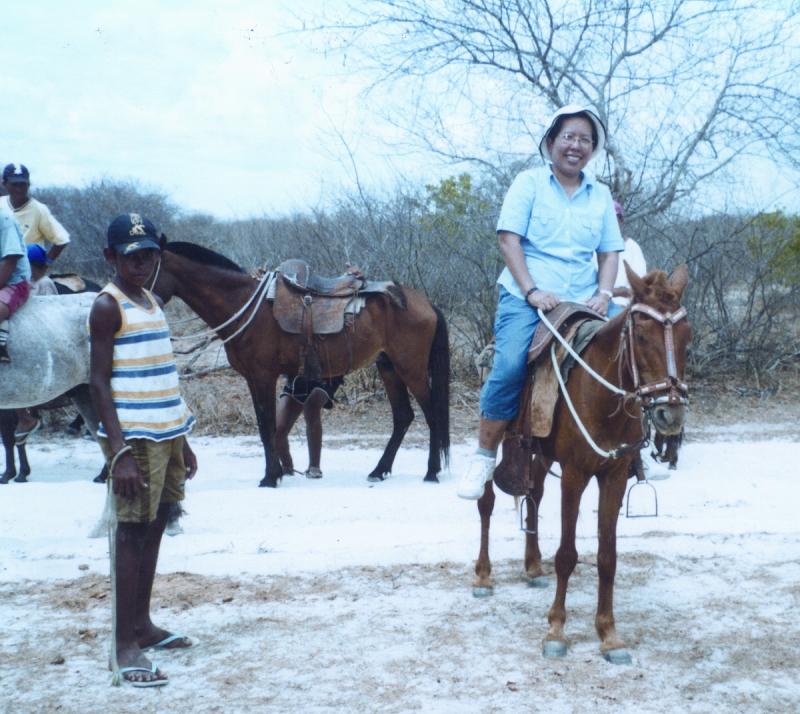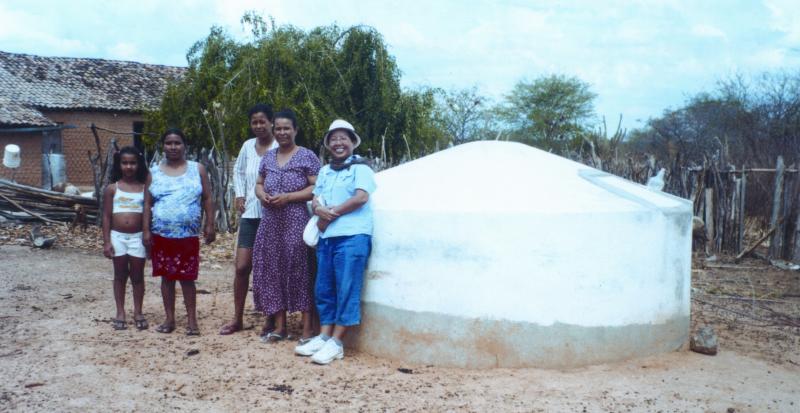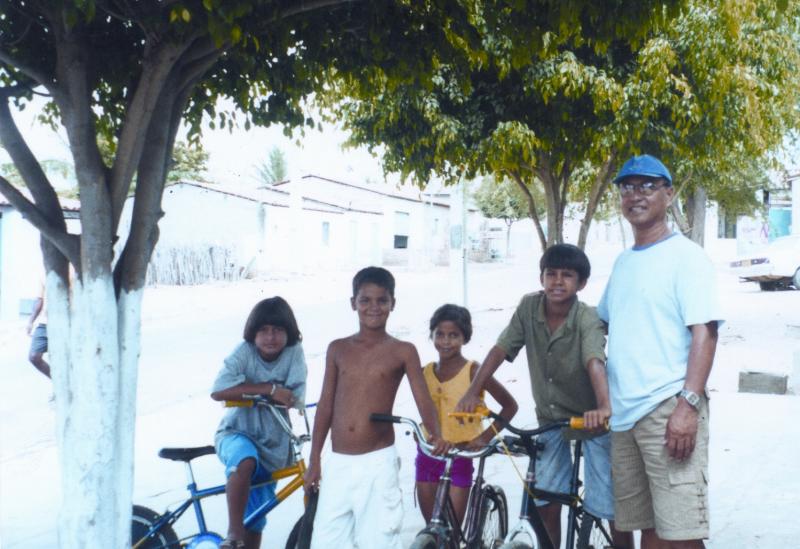Beyond The Borders Of Pagadian To The Peripheries Of Juazeiro
By Sister Cresencia G. Lagunsad CB
Sister Cris, from Kidapawan, Mindanao, is a member of the Sisters of Charity of St Charles Borromeo and is based in Maastricht, Netherlands.
Recently, I made a short visit to the Diocese of Juazeiro, near São Salvador da Bahia, Brazil. It was a dream-come-true for one with a long-standing interest in that country, fascinated by its people. There was always that wish that someday, somehow I’d encounter Brazil up close. So when the pilot announced our approach to Salvador from Lisbon, a mixed feeling of joy and anxiety overwhelmed me, normal for a newcomer, I reminded myself.
As I moved through immigration I wondered what I was up to in this absolutely alien place. Incredible! I was expressing my thoughts out loud as I collected my suitcase. A gentleman standing next to me smiled and uttered incomprehensible words as he helped me. I wanted to back out. However, I managed to put into perspective the purpose of my trip and its significance for me and my community.
A thought flashed through my mind. What if my lone contact in Brazil wasn’t there to meet me? He had the names and addresses of everyone I was to see. Unexpected changes in my flight-schedule had caused some confusion. I felt a surge of panic and exhaustion. It was past nine in the evening and the thirty-six hour trip was beginning to take its toll on me. Regaining some strength and the confidence I usually have, I proceeded out of the terminal.
What a relief to quickly find him there with a taxi-driver friend! It was almost three years since we had last met, in Manila. His stories of ministry in Juazeiro and his deep and expansive sense of mission had encouraged me to visit. He facilitated my coming and set up a schedule for my time there.
In twenty days we accomplished much. I met Dom Jose Geraldo da Cruz, Bishop of Juazeiro. I visited the parishes of Remanso, Pilao Arcado, Campo Alegre, Sento Se and some areas in Juazeiro itself. For a couple of days, I was also able to visit some areas and communities in the city of Salvador. I saw and heard much about these places, especially from the pastors, religious sisters and lay people engaged in specific ministries and programs there.
I thought I had seen the worst that pervasive and massive extreme poverty can bring to individuals, communities and to a society as a whole. My encounters in Brazil with the realities of AIDS, prostitution, drug abuse and its consequences, abandoned and street-children challenged my belief that I had enough of these in my own country. Being deprived of basic needs such as decent housing, food and clothing, of access to good health and education, can be very limiting and cripple many possibilities in life. Day by day I was reminded that there is a poverty not yet fully known to me. I sensed it in the faces and bearing of those poor Brazilian women. At first it was a very oppressive and depressive thought which later developed into an insight for exploration in my reflections. Is my option for the poor really animated by the spirit of solidarity with them? Or is it just coming from my own insecurities and needs? Do I really know, understand and feel what it means to be poor? Am I really being transformed by this option? I just wonder when these questions will stop haunting me.
In the interior of the parishes there are basic ecclesial communities which the parish pastors visit at certain times of the year. The frequency of visits is affected by the distance and the condition of the roads. Roads are often impassable during the rainy months. There are also sandy roads that remain difficult throughout the year, where heavy-duty trucks get stuck.
The water-supply is lacking in the interior. Throughout the year people rely on lake-like sources of collected rainwater for almost all their needs including drinking and cooking. Many have to walk miles to fetch water from the nearest so-called sources. Planting short-term crops is done in the rainy months. If the harvest is good then there’s enough to consume for the whole year.
It looks like an extremely difficult life! But it’s in these realities that the inherent goodness in humans is authentically expressed. People do things for others out of sheer loving service. No form of compensation is expected in return. One teacher gathered the poor children in one of the slums and started feeding and teaching them. Several women later joined her and together they continue to serve hundreds of preschoolers as volunteers. The school continues to exist out of the generosity of those who have the heart, not necessarily the money.
A nun started gathering young boys and girls on the streets. They were everywhere, on drugs and in the flesh trade as early as twelve years of age. Now they have a clear program and a home that continues to exist because of the concerted efforts of volunteers and benefactors. In one of the city’s busy streets there’s a center for women of the 'oldest profession’ that offers them services out of love and solidarity. Another nun drives miles to follow-up AIDS victims in their homes, providing them with the basic necessities worthy of humans. All these acts of love are by people whose names will never be acclaimed.
Parishes, projects and programs still run by foreign missionaries, especially from affluent nations, have sufficient resources. The ‘water tank for every home’ project, the family-centered children’s pastoral program, the primary health-care program endorsing the use of local herbs as medicines, centers for women, housing assistance, scholarships and income-generating projects are just a few of the many ways that enable the poor.
There is a deep peace and happiness in the lives of the missionaries I met in Juazeiro and Salvador. Most are from Europe and the USA. An Australian and a Filipino add to the diversity. They do not have the comforts of life like those in their home countries, but they have the affection and the vivaciousness of the Brazilian people. There is life in these people. If there’s life, there’s always love, hope and faith. These are constantly reflected in their struggle to improve their lives and the lives of those they care about. It is in the Brazilian’s constant struggle for quality of life that foreign missionaries participate.
One common difficulty remains though: lack of laborers in God’s vineyard. Programs and projects supported by their friends and families and by funding agencies back home are geared towards holistic human development. Concrete appropriate and relevant programs have to be drawn-up, implemented, monitored and evaluated if development projects are to respond to the people’s needs. More workers willing to journey with the people toward self-reliance are badly needed.
I will cite the most beautiful contribution of my contact friend in Brazil to the spirit of the mission of the Church. From day one to the last day of my orientation trip, he brought me to the peripheries of the lives of the Brazilian people. I asked him what made him continue to stay in Juazeiro. There are many areas in his home diocese of Pagadian that also need his services as a priest. He always answered that he doesn’t belong only to the local church of Pagadian but to the Universal Church. Though aware of the possibilities for comfort and prestige in the Philippines or in other well-off countries, given his talents, skills and trainings, he still chooses to serve on the frontier of the Church in Brazil.
Piláo Arcado, the parish where he’s now associate pastor, is the biggest in area in the Diocese of Juazeiro. I’ve trodden some of the long and winding bad roads there, been confronted by the scarcity of water and rendered helpless by the overall poverty of the people. These don’t weaken his commitment to be with them. He even intends to stay longer, maybe forever.
He doesn’t have the financial resources some of his contemporary missionaries have. He happily and generously offers himself to the people he serves, grateful for what he finds and is offered to him. He radiates the joy of an artist as he does murals for several churches, works on architectural designs and engages himself in the music ministry. His talents are widely known and he never tires of using them.
Padre Chico, as he is fondly known in Brazil, belongs to the Diocese of Pagadian and under the auspices of the Columbans became the first priest of that diocese to join the mission in Brazil more than a decade ago. Now at 56, he is keener on his painting and music as expressions of a deep encounter with the God of the mission. He doesn’t find a gap between his art and priesthood. Rather, sustained by solitude and prayer, he experiences the intimacy of these two gifts in his life. The union of his priesthood and art is the most beautiful gift that he offers the mission.
Padre Chico is Father Francisco ‘Frank’ L. Pintac, from Aurora, Zamboanga del Sur. In twenty days I encountered in him a heart that belongs to the mission of the Church. And he is convinced that the Philippine Church could share more priests, religious men and women and lay workers on overseas mission. Foreign mission should now become part of formation and ministry of the Philippine church, according to him. What a big challenge!
I left Juazeiro and Salvador enriched and grateful with another dream … I am going back! Not merely out of fascination or for orientation but to respond to a call sprouting from deep within. Is there anyone out there willing to join me in this new dream? Come and see!



